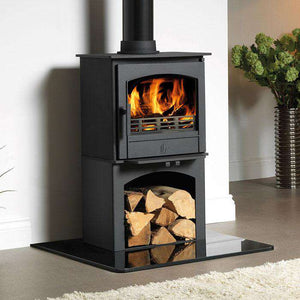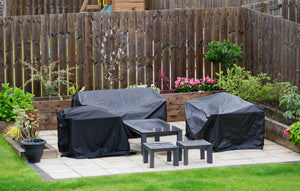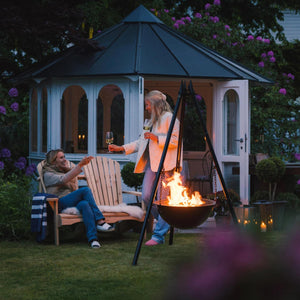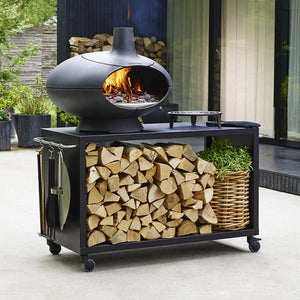5 benefits of switching from an open fire to a log burner

Environmental concerns and the rapidly increasing cost of energy are hot topics just about everywhere in 2022.
And, while much has been said about the detrimental impact of burning wood to heat our homes, it turns out that wood burners are more efficient than an open fire.
A significant increase in heating efficiency is just one of the many ways that switching from an open fire to a wood burner can benefit you.
Wood burners offer many benefits over open fireplaces
Research by the Stove Industry Alliance is clear that one of the worst ways to burn wood at home is through an open fire.
While an open fire can feel like it’s the better option, it actually releases around ten times more of the emissions that harm the atmosphere. On top of that it’s far less efficient in actually heating your home.
Open fires require more wood and give out less heat than a wood burning stove, so give the worst of both worlds. So, for anyone considering making the switch from their open fire to a log burner, here’s a comprehensive overview of the benefit of doing just that.
Wood burning stoves help to keep energy costs down
In the UK, we’re dealing with unprecedented hikes in energy costs and there is more reason than ever to find the most efficient way to heat your home. And with an open fireplace, you will be losing heat and hiking up the cost.
In terms of heating, a log burner is up to 80% efficient compared with an open fire at just 30%. There is also the issue of smoke, which is emitted in far greater quantities from an open fireplace.
An open fire needs approximately 16 logs of wood to emit the same amount of comforting warmth as a stove does with five. Given that 40% of wood burned in the UK is in open fireplaces, if everyone made the switch to a stove that would be an enormous saving in emissions.
Let’s dig deeper into the statistics surrounding emissions from log burning stoves and list the reasons why it benefits making the switch from an open fireplace.
5 reasons to switch from an open fire to a wood burner
- Research supports log burners over open fires
Between 25% and 33% of London’s total fine particle air pollution derives from domestic wood burning, according to stats from King’s College London. On the surface, that looks like bad news for a log burner.
However, deeper analysis shows that 70% of these emissions from wood burning come from open fires rather than log burners.
Interestingly, outside of London and the SE, there are far fewer people with log burning stoves. Stats show that around 5% of the population has one at a national level, with 16% in the South East.
This shows just how little overall impact a log burning stove has on emissions. And at a time when it’s becoming more important than ever to cut emissions in order to be on target for the Government’s 2050 Net Zero target, there is little evidence to show that stoves are the culprit. It’s clear, however, that open fires are contributing significantly to emissions.
- Ecologically sound log burning stoves are now standard
The design and functionality of log burning stoves has come a long way over the past 20 years. Technological advances mean that wood burners are now far less polluting than an open fire – but also much less than they used to be.
Modern wood burners are greener than older versions. We have a range DEFRA approved wood burning stoves that make finding the most ecologically efficient wood burner easy.
Wood burning stoves that are officially designated as a Defra Smoke Exempt Appliance, have been given the stamp of approval by the Department of Environment, Farming and Rural Affairs for emission levels. This also covers the amount of smoke it produces when it’s burning.
A DEFRA approved stove will always give the minimum possible level unnecessary smoke emitted during combustion. This also means it complies with the Government’s Clean Air Act and can be burned within any UK Smoke Control Area.
By switching from an open fire to a log burner, you’ll be actively helping to reduce the amount of damaging emissions from wood burning.
- Your log burner will use renewable fuel
Another element of concern often expressed regarding log burners is the concept of burning wood as fuel. However, wood is a renewable fuel and is far better for the environment (and our wallets!) than the energy produced from fossil fuels such as gas and oil.
Sustainable wood produces less CO2 than electricity, gas, coal or peat according to scientific research.
- Recoup some of the money that energy providers demand
Energy bills have increased sharply over the last 12 months. In October 2021, the average household energy bill was £1400 per year. Estimates now say that this could rise to a whopping £4,266 by January 2023.
This is contributing to the cost of living crisis and there are no signs that the Government intends to reign the energy giants in.
Burning wood in your log burner allows you to wrestle back some control, and it’s likely that any increase in fuel costs will be far less than the rapid escalation in the cost of gas and electricity
Sustainable wood burning is labelled as carbon neutral, which means with a log burner you are contributing less to emissions than if you use gas, electricity or burn wood in an open fire.
- Log burners are very efficient
Technological developments mean log burners are less damaging to the environment than ever before, but also that they are more efficient than they’ve ever been.
You lose far less heat burning wood in a log burning stove than in an open fire. Most log burners have an efficient of more than 80% (just 20% is lost via the chimney). On the other hand, open fires lose as much as 80% of the heat they generate through the chimney.
The net result is that log burners are far, far more efficient in keeping your living space warm than an open fire. Of course, very old stoves are less efficient than new models, so whether you’re swapping from an open fire or looking for an easier way to heat your house, we’d recommend installing a new wood burning stove.
For our full range of wood burning stoves click here.
- Stovesupermarket Admin








